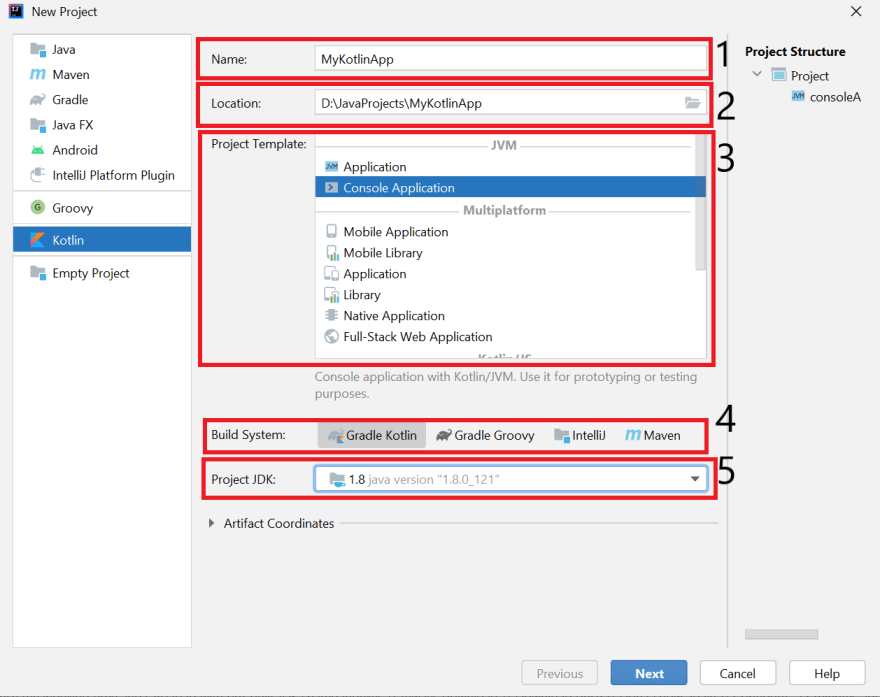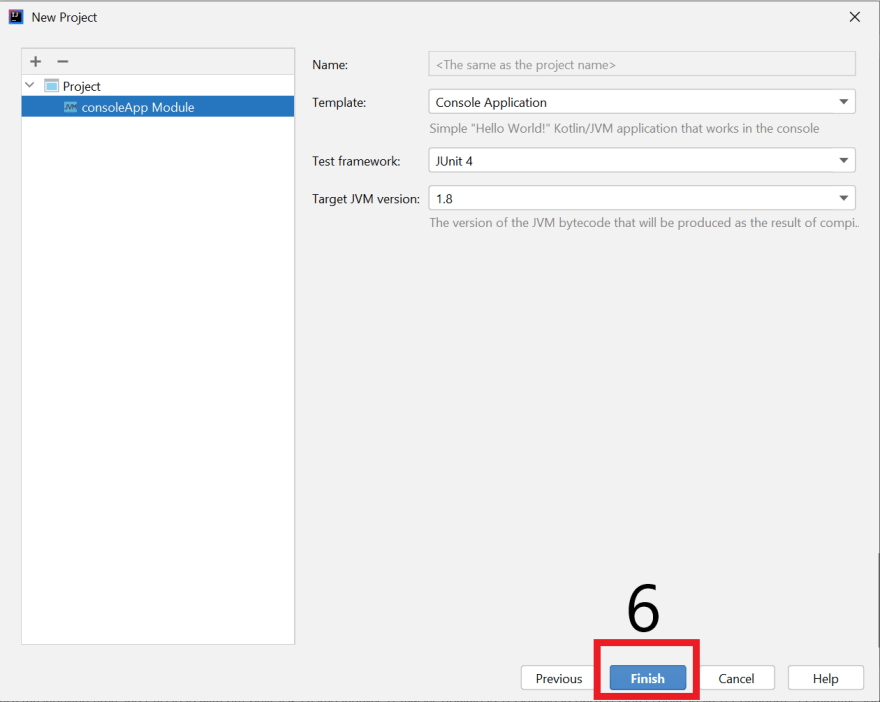41
Kotlin Tutorial - 1 Introduction
Kotlin is a programming language that commonly used in many cases including mobile application development for Android, web application development and others.
Before using Kotlin, make sure the Java is installed. After the Java is installed, write Kotlin codes using specific IDE called IntelliJ IDEA Community Edition that can be downloaded here.
To create the first Kotlin program, Open the IntelliJ IDEA and follow these steps:
Those steps is illustrated in this screenshot.


After the project is created, write this code.
fun main (args: Array<String>) {
println("Hello World!")
}This is the output after the code is executed.
Hello World!Based on the code above, the
println function is executed inside main function that prints out the Hello World! to the console. Notice that the semicolon (;) is not required when writing the Kotlin codes.This is the basic syntax to create a variable in Kotlin.
// with data type
var variable_name: data_type = value
// without data type
var variable_name = valueThis is the basic syntax to create a variable that the value can be assigned only once using
val. When using val, the variable becomes immutable variable.// with data type
val variable_name: data_type = value
// without data type
val variable_name = valueThis is the basic syntax to create a constant in Kotlin. Constant is a variable that the value cannot be changed.
// available only in global scope
const val variable_name = valueIf the value of variable is not initialised. The data type must be specified.
This is the example of creating variables in Kotlin.
// create a constant that available in global scope
const val APPLICATION_NAME: String = "MyKotlinApp"
fun main() {
// create a constant that only available in main function
val PI: Double = 3.14
// create a variable called radius
val radius: Double
// initiate the value in radius variable
radius = 7.0
// create a variable called area
var area = 0.0
// assign the calculation result into area variable
area = PI * radius * radius
// print out the result
println("App Name: $APPLICATION_NAME")
println("The area of circle: $area")
}Output
App Name: MyKotlinApp
The area of circle: 153.86Based on the code above, some variables that already created, the data types can be specified or not. Some variables like
PI, radius and APPLICATION_NAME have the specified data types. The area variable's data type is not specified but the value has to be assigned. Notice that inside println() function the variable's value is printed using $ (dollar sign) followed with the variable's name.There is another variable in Kotlin called
lateinit var. This variable is useful to create a variable that the value is not directly initialised or will be initialised in specific conditions.This is the basic syntax of creating
lateinit var variable.// The data type must be specified
lateinit var var_name: data_typeIn Kotlin, the nullable values is annotated by
? notation after the variable's data type. The nullable values notation can be used for variable that could contains null value.In this example, the
name variable is a nullable value.fun main() {
// added into variable
val name: String? = null
// use ? notation to access the variable's function
val index = name?.indexOf("z")
// prints out the index
println("index: $index")
}Output
index: nullBased on the code above, the code is still executed although the value is null at
name variable. This happens because the ? notation is used to specify that the certain value is nullable.This is the list of commonly used data types in Kotlin.
| Data Type | Value | Minimum Value | Maximum Value |
|---|---|---|---|
| Byte | non-decimal number | -128 | 127 |
| Short | non-decimal number | -32768 | 32767 |
| Int | non-decimal number | -2147483648 | 2147483647 |
| Long | non-decimal number | -9223372036854775808 | 9223372036854775807 |
| Float | decimal or floating number | 1.4E-45 | 3.4028235E38 |
| Double | decimal or floating number | 4.9E-324 | 1.7976931348623157E308 |
| Boolean |
true or false
|
- | - |
| Char | single character (alphabetic) | - | - |
In Kotlin, there many arithmetic operators that can be used. The arithmetic operation must be done with the same data type.
| Operator | Description |
|---|---|
+ |
add operation |
- |
substract operation |
* |
multiply operation |
/ |
division operation |
% |
modulo operation (get the remainder from division operation) |
This is the example of arithmetic operations in Kotlin.
fun main() {
val a = 9
val b = 5
println("a + b = ${a + b}")
println("a - b = ${a - b}")
println("a * b = ${a * b}")
println("a / b = ${a / b}")
println("a % b = ${a % b}")
}Output
a + b = 14
a - b = 4
a * b = 45
a / b = 1
a % b = 4Based on the code above, the arithmetic operations is wrapped inside
${} notation to prints out the operation's result.Kotlin has similiar modifiers with Java programming language. This is the list of modifiers that available in Kotlin.
| Modifier | Own Class | Sub Class | Package | Outside Package |
|---|---|---|---|---|
| public | ✔ | ✔ | ✔ | ✔ |
| protected | ✔ | ✔ | ||
| private | ✔ | |||
| internal | ✔ | ✔ |
The check mark (✔) represents the visibility.
By default, the modifier is public. The modifier can be added before declaration.
// add modifier into function
internal fun randomizer() {}
// add modifier into variable
private val name: String = "test"In Kotlin the type conversion can be done by using
as keyword. The unsafe conversion throws exception if the conversion fail. The safe conversion returns null if conversion fail.// unsafe conversion
val variable_name: target_type = other_variable as target_type
// safe conversion
val variable_name: target_type? = other_variable as? target_typeFor numeric values, the type conversion can be done by using the data type's function. For example to convert into
Double data type use toDouble().// "to" followed with numeric data type
toDouble()This is the example of type conversion for numeric values.
fun main() {
val number = 24
val floatNum: Float = number.toFloat()
val doubleNum: Double = number.toDouble()
println("Int value: $number")
println("Float value: $floatNum")
println("Double value: $doubleNum")
}Output
Int value: 24
Float value: 24.0
Double value: 24.0Based on the code above, the
toFloat() function is used to convert into Float data type and the toDouble() function is used to convert into Double data type.To check the data type of variable, use
is keyword followed with the data type that wants to be checked.variable_name is data_typeIn this example, this code is used to check if
num variable is an Int.fun main() {
val num = 25
if (num is Int) {
println("num is an integer")
}
}Output
num is an integerI hope this article is helpful for learning the Kotlin programming language. If you have any thoughts or comments you can write in the discussion section below.
41
